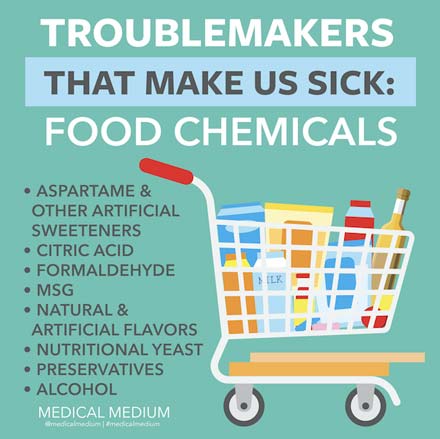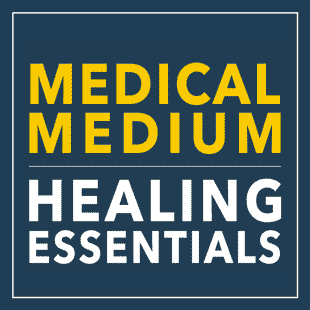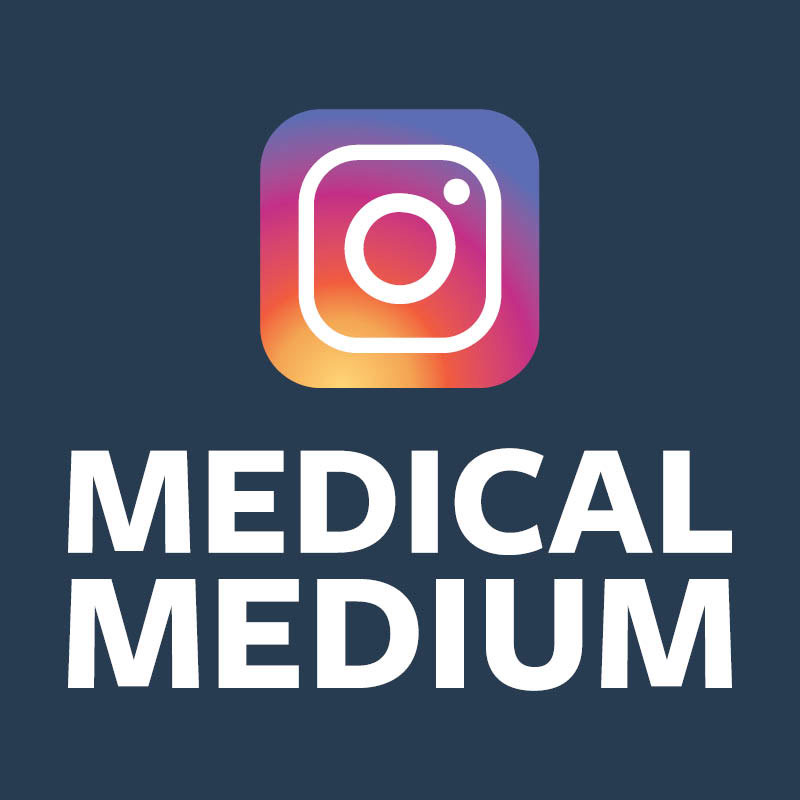Watch: Troublemakers That Make Us Sick - Food Chemicals

Troublemakers That Make Us Sick - Food Chemicals
If you have a chronic illness or symptom such as acne, eczema, headaches, reproductive issues, bloating, anxiety, IBS, weight gain, SIBO, or any other symptom or condition, or you simply want to have the best health possible in the future, it’s important to avoid common food chemicals that can exacerbate symptoms. I talk about these food chemicals in Medical Medium Cleanse To Heal: Healing Plans for Sufferers of Anxiety, Depression, Acne, Eczema, Lyme, Gut Problems, Brain Fog, Weight Issues, Migraines, Bloating, Vertigo, Psoriasis, Cysts, Fatigue, PCOS, Fibroids, UTI, Endometriosis & Autoimmune and share how you can cleanse to remove them from your body.
If you wish to heal, I recommend limiting or altogether avoiding the following:
- Aspartame and other artificial sweeteners
- Citric acid
- Formaldehyde
- Monosodium glutamate (MSG)
- Natural and artificial flavors
- Nutritional yeast
- Preservatives
- Alcohol
Many people are sensitive to these ingredients, and while some of them can seem fun in the moment, their effects on our physical and emotional well-being aren’t so enjoyable. I share exactly how you can cleanse your body of these food chemicals in Cleanse To Heal.
Aspartame and other Artificial Sweeteners
You’ll find this in diet sodas as well as hidden in flavoring. Aspartame goes into the liver’s deep, inner core and is unique in the way it’s stored in the liver—it tends to injure small blood vessels inside the liver, causing them to atrophy or shrink. Other artificial sweeteners are also highly toxic to the liver.
Citric Acid
Citric acid is very irritating to the linings of the stomach and the intestinal tract, so it can create a lot of inflammation and discomfort if you’re sensitive to it. Citric acid (the additive) is not the same thing as naturally occurring acid in citrus. Try not to confuse the two. Citrus itself is a healing food. The isolated ingredient citric acid, however, is often corn derived. Especially if you’re experiencing any kind of stomach pain, keep an eye out for citric acid on ingredient labels and consider skipping foods that include it.
Monosodium Glutamate (MSG)
MSG typically builds up in your brain, going deep into your brain tissue. It can then cause inflammation and swelling, kill thousands of your brain cells, disrupt electrical impulses, weaken neurotransmitters, burn out neurons, make you feel confused and anxious, and even lead to micro-strokes. It also weakens and injures your central nervous system. MSG is especially harmful if you have an illness that involves your brain or central nervous system. However, there are no circumstances under which it’s good for you. As a result, this is an additive you should always avoid.
The following terms usually mean that MSG is an ingredient: glutamate, hydrolyzed, autolyzed, protease, carrageenan, maltodextrin, sodium caseinate, balsamic vinegar, barley malt, malt extract, yeast extract, brewer’s yeast, corn starch, wheat starch, modified food starch, gelatin, textured protein, whey protein, soy protein, soy sauce, broth, bouillon, stock, and seasoning.
Natural and Artificial Flavors
Any ingredient with a name like natural flavoring is hidden MSG. Natural cherry flavor, natural orange flavor, natural lemon flavor, natural fruit flavor..they’re not just fruit extracts. The same goes for smoke flavor, turkey flavor, beef flavor, natural peppermint flavor, natural maple flavor, natural chocolate flavor, natural vanilla flavor, and so on. (Although pure vanilla extract is safe to use.) Each type of natural flavor potentially contains multiple biohazards and chemical compounds.
Artificial flavors can represent any of thousands of chemicals that were birthed in a lab. Don’t take risks by consuming them.
Nutritional Yeast
Nutritional yeast is an MSG-contaminated ingredient—there’s a reason why it’s so addictive, with people pouring it on to flavor countless foods. It also has the potential to be an irritant to the digestive system and feed bugs such as unproductive bacteria.
Preservatives
If you’re already anti-preservative and take care to buy foods that don’t list them in the ingredients, it doesn’t mean they’re not sneaking into your food. Accountability is reckless as far as preservative labeling goes. Not to mention that there were all those years before you became aware, so your liver had plenty of time to collect different varieties of chemically created preservatives. Your liver could be holding on to preservatives from hot dogs you ate decades ago, cotton candy from a fair, a milkshake with imitation fruit flavoring, a purple ice cone…the list is never-ending.
Alcohol
Alcohol is extremely hard on the liver, causing it to become sluggish and stagnant and injuring liver cells. When someone drinks, it hinders the liver’s ability to acknowledge, decipher, extract, and retain the vitamins, minerals, and other helpful materials that are also coming in through the blood. It slows down the liver’s ability to run its over 2,000 chemical functions for the body. (Don’t let this stop you from using hand sanitizer with alcohol in it. Killing off the flu virus or strep from a public bathroom or other germy spot outweighs what your liver’s going to receive from that sanitizing wipe.)
In the case of herbal tinctures, actively seek out alcohol-free versions (avoid the word ethanol, too). You can also refer to my supplement directory of preferred supplements. I don’t sell supplements or own a supplement company; I simply maintain a directory of high-quality supplements to help you.
Formaldehyde
You can be exposed to this troublemaker from so many sources, everywhere from cosmetics to pharmaceuticals to carpets to food. It does what alcohol does to the liver, only much more extreme. It’s also a viral fuel.
Find out more about the troublemakers to avoid and how to heal in Cleanse To Heal.
This item posted: 18-Sep-2020
The information provided on this Site is for general informational purposes only, to include blog postings and any linked material. The information is not intended to be a substitute for professional health or medical advice or treatment, nor should it be relied upon for the diagnosis, prevention, or treatment of any health consideration. Consult with a licensed health care practitioner before altering or discontinuing any medications, treatment or care, or starting any diet, exercise or supplementation program. Neither Anthony William nor Anthony William, Inc. (AWI) is a licensed medical doctor or other formally licensed health care practitioner or provider. The content of this blog and any linked material does not necessarily reflect the opinions of Anthony William, AWI or the principal author, and is not guaranteed to be correct, complete, or up to date.
Thanks for printing this post. For more, visit www.medicalmedium.com


